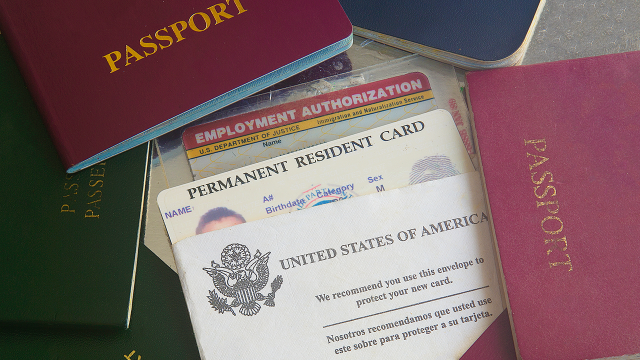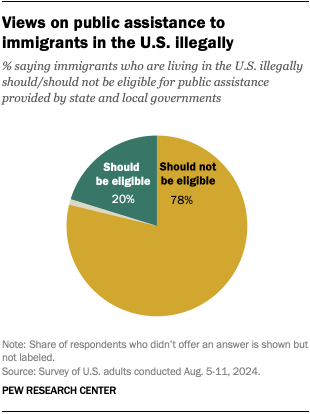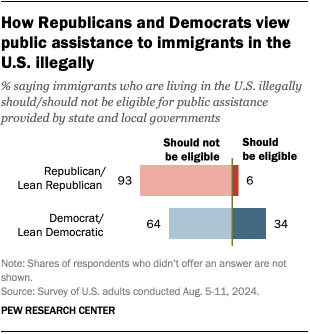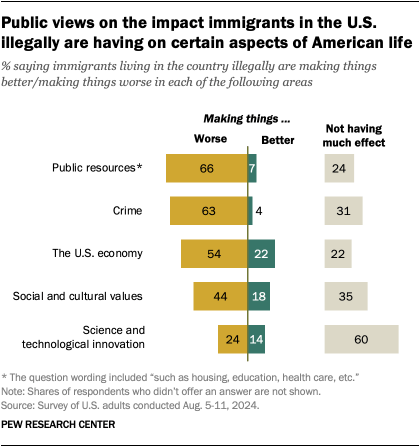
Background
In 2023, almost 48 million immigrants lived in the United States, either legally or illegally. This number has grown sharply over the past 50 years. Immigrants now make up roughly 14.3% of the U.S. population.
Mexico is the top country of birth for U.S. immigrants. The next largest is India. Beyond those two countries, immigrants come from all over the world.
Most immigrants are in the U.S. legally. But in 2022, 23% of the nation’s immigrants were in the country illegally. This means they either entered the country without legal permission or arrived on a nonpermanent visa and stayed after it expired.
Public opinion polling says …
Pew Research Center conducted a survey of U.S. adults in August 2024 to learn more about public views on immigration.

When Americans were asked whether immigrants who are living in the U.S. illegally should be eligible for public assistance provided by state and local governments, here’s what they said:
- 78% say immigrants living in the U.S. illegally should not be eligible for this type of assistance.
- 20% say they should be eligible.
The public is much more supportive of government assistance for legal immigrants. Eight-in-ten adults say immigrants living in the U.S. legally should be eligible for state and local government assistance, while 19% say they should not.
How views differ by partisanship

Americans’ views on whether immigrants who are living in the U.S. illegally should be eligible for public assistance from state and local governments differ by party identification.
Even so, majorities of both Republicans and Democrats say unauthorized immigrants should not be eligible for this type of assistance.
- 93% of Republicans and independents who lean Republican say they should not be eligible.
- 64% of Democrats and those who lean Democratic say the same.
How does the public feel about the impact unauthorized immigrants are having on the country?
The survey asked about the impact immigrants who are living in the U.S. illegally are having on a few different aspects of American life.
- Majorities say immigrants living in the U.S. illegally are making things worse when it comes to public resources such as housing, education and health care (66%), crime (63%), and the economy (54%).
- Fewer than half say these immigrants’ impact on social and cultural values is negative (44%).
- 60% say unauthorized immigrants are not having much of an effect on science and technological innovation.
We also asked about the impact immigrants living in the country legally are having. For each item, higher shares say legal immigrants are either making things better or not having much effect.
What does polling say about related topics?
- Overall, a majority of Americans – 64% – say there should be a way for undocumented immigrants who are living in the U.S. to stay in the country legally, if certain requirements are met; 35% say they should not be allowed to stay.
- A majority – 63% – also say America’s openness to people from all over the world is essential to who we are as a nation; 35% say that if America is too open to people from all over the world, we risk losing our identity as a nation.
- Still, the public is concerned about the number of immigrants entering the country illegally: 77% say they are at least somewhat concerned about this, with 52% saying they are extremely or very concerned. About one-in-five (22%) say they are not too or not at all concerned about this.

Discussion questions
- Did anything about this data surprise you?
- Why do you think it’s important to ask people separately how they feel about immigrants who are here illegally and those who are here legally?
- Do you think policymakers should consider public views when making laws about immigration?
Additional resources

What the data says about immigrants in the U.S.

Trump and Harris Supporters Differ on Mass Deportations but Favor Border Security, High-Skilled Immigration

Immigration attitudes and the 2024 election
We would like to thank the Legislative Semester for providing advice and counsel on sharing Pew Research Center’s data with high school students.
Recommended Citation language:
Pew Research Center, DECEMBER 2024, “Government aid to immigrants in the U.S. illegally”